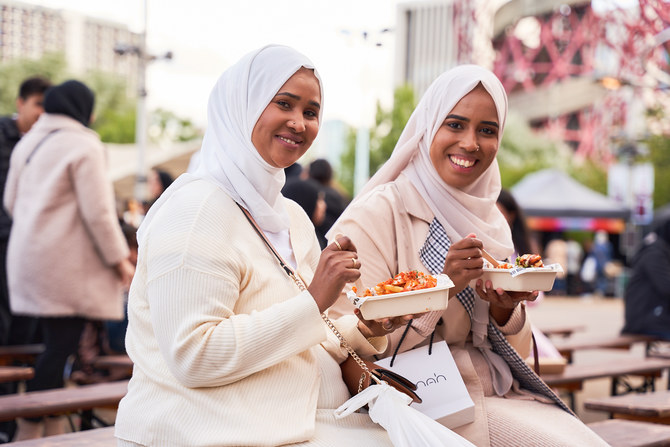LONDON: The Halal Food Festival returned to the UK capital this year for its sixth edition with 25 cuisines on offer at more than 150 stalls.
At least 18,000 people attended the two-day event, which ran from Sept. 24-25 at London Stadium in Queen Elizabeth Olympic Park.
The scale and scope of the festival mean London now hosts one of the largest specifically halal food gatherings in the world, according to organizers.
Kevin Jackson, director of Algebra Festivals, launched the festival with his partner Waleed Jahangia seven years ago.
“We created an event that would put food at the heart of the community. There’s no better way of sharing culture than through food,” he said.
After two years of the COVID-19 pandemic, organizers have invested heavily in infrastructure, transforming the festival into an experience that goes beyond food.
The event featured a VIP lounge, shopping stalls, live entertainment, cookery theater, picnic area, kids play area, mechanical bull and fun competitions.
One of the highlights was a live demonstration by NHS doctor and former “MasterChef” winner Dr. Saliha Mahmood Ahmed.
Using bread dough to teach women how to examine themselves for early signs of breast cancer, Ahmed aimed to overcome cultural taboos that contribute to low cancer awareness among the Muslim community in the UK.
The new additions reflect the growing view that halal is more than just about food but is a lifestyle, too.
Jackson recalled that when he and Jahangia launched the festival, most Muslim events in London were held in community centers or school halls.
But the London Stadium event shows the Muslim community now has access to some of the most renowned venues in the capital.
The festival has also evolved into a cultural melting pot, with both its cuisine and its foodies coming from around the globe.
“We’ve got people from Manchester, Birmingham, people who came on a day trip from Paris yesterday. We’ve got people from Spain. We’ve got people from Scotland. This is such a big event for the Muslim community that they travel for miles to come to it,” Jackson said.
Chef Fatima El-Rify of Mama Hayam reported positive feedback from visitors tasting her Egyptian cuisine.
“They didn’t know what it was completely. They knew a little about kosheri, but now they have a really strong idea. They’re coming back for more. They’re bringing their friends. They really love kosheri and mahshi, so that’s really good.”
She added: “I think there is nowhere else in London that you can try all these different cuisines and just have this ease of it all being halal.”
The festival also features the timeless and the contemporary, from Jordan’s traditional Anabtawi Sweets to London’s Lola’s Cupcakes.
Apart from catering to Muslim visitors, it aims to provide an international platform for the halal economy, while helping to nurture halal small and medium enterprises.
“We’re building business relationships. The traders all trade with one another. The suppliers, our partners here, Tariq Halal, are providing products for our exhibitors,” Jackson said.
Founder Shahin Bharwani of Mocktail Company, which sells non-alcoholic beverages, said that she was fortunate to have been able to exhibit at the Halal Food Festival in 2016 within months of launching her business.
“It was brilliant in terms of being a startup to get the brand exposure needed at this type of event.”
Festival vendors reflected on the halal industry’s growth in the past decade.
Bharwani said: “There’s so many variations of businesses here, particularly the food. Years ago you could never imagine halal tacos hell or gourmet burgers, that type of thing, so to have those kinds of halal options now is amazing.”
Co-partner Abid Haider of Proper Burgers said that the event “just keeps getting bigger and bigger.”
With the industry now worth billions, the London festival is part of a growing movement placing halal on high street.























